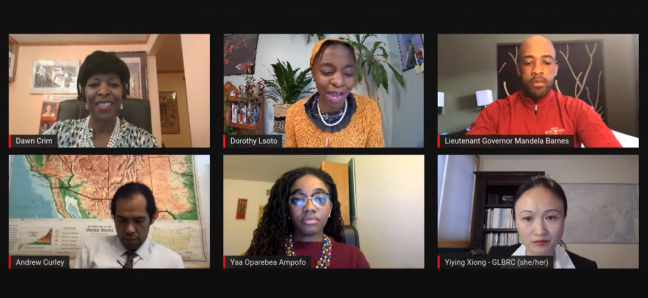To create an equitable future while combatting climate change, policymakers must dismantle disparities and empower underrepresented voices, experts said in a Wisconsin Institute for Discovery panel on Tuesday night.
The virtual event was this year’s final talk for the WID “Crossroads of Ideas” series, which features monthly lectures during the academic year.
The event featured five panelists with different backgrounds regarding climate change, who spoke about their unique perspectives and how they included equity. Wisconsin Department of Safety and Professional Services secretary Dawn Crim moderated the event. Crim said the communities who contribute the least to climate change are suffering the most from it.
The panel discussed how people of color are disproportionately affected by climate change.
Media institutions have been complicit in climate-related misinformation, journalist says
Great Lakes Bioenergy Research Institute associate director Yiying Xiong said it is important to raise awareness of existing inequities. Often, communities of color live in areas with less access to fresh water, are more vulnerable to natural disasters such as floods or drought and live in areas with poor energy infrastructure, Xiong said.
According to Xiong, a study during the Texas power outages in February found areas with more people of color had a 47% chance of losing power, compared to only an 11% chance for primarily white communities.
Environmental justice is a gateway issue that is related to many others. Lieutenant Governor of Wisconsin Mandela Barnes said tackling environmental justice could also address income inequality, health disparities and education outcome disparities.
UW School of Education PhD student Yaa Ampofo said education disparities are a significant factor in climate change equity. Currently there are hierarchies in which knowledge and which perspectives are valued, which results in not everybody’s voice being acknowledged.
“An educational approach to an equity approach to climate change needs to think about these hierarchies and needs to think about how we dismantle these hierarchies,” Ampofo said.
Wisconsin offers seedlings to its landowners to aid reforestation
For Indigenous nations the issue of sovereignty is heavily tied to environmental justice. University of Arizona assistant professor and Navajo nation member Andrew Curley said often Indigenous voices are overlooked in matters where their environment is affected, for example the establishment of oil pipelines.
Curley said environmental aspects of Indigenous communities lead to disadvantages which exacerbate catastrophic events like natural disasters.


















